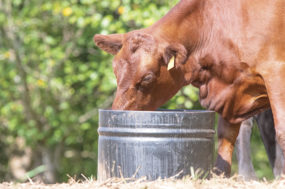Nutritionists have been working for decades on ways to improve rumen efficiency and optimize cattle performance. Ruminants establish an essential relationship with their ruminal microorganisms, providing nutrients that cultivate microbial populations and maintain processes such as fiber degradation, volatile fatty acid (VFA) production, and synthesis of water-soluble vitamins and bacterial proteins of high biological value. These processes require energy and protein and, like most processes, generate some level of waste. Like all biological systems, this waste is excreted in feces and urine along with some compounds being either respirated or eructated out of the body. Improving fermentation efficiency contributes to the overall health of the animal, makes better use of natural resources, provides economic benefits and offers a more-affordable human food supply.
Researchers are exploring ways to modulate the diverse population of ruminal microorganisms to improve energy and protein efficiency in the rumen. Feed additives can support this objective by inhibiting or stimulating specific microbial populations. Specifically, certain combinations of plant extracts have demonstrated a performance enhancement effect for ruminants similar to that of other commercially available products.
Extract-based feed additives
Plants produce various bioactive components with different properties and functions, including essential oils that can have significant interactions that both promote biological activities or aid in defense against other organisms. Essential oils are approved in the U.S. and other countries for both human and animal nutrition. In recent years, with the support of research trials, essential oils have demonstrated increasing importance in livestock nutrition. Researchers now have data indicating the ability of essential oils to help animals cope with stress, deter insects that can be vectors for disease, and support health and growth performance. In ruminants, specific plant extracts can improve rumen efficiency, altering energy and protein partitioning, resulting in greater amounts of human-consumable protein while conserving resources.
Over 20 years of in vitro studies have identified the essential oils most effective in selecting and stimulating the proliferation of rumen microflora, increasing the amount of propionate, and reducing the production of acetate and methane without altering the total amount of VFAs. This includes extracts of garlic, cinnamaldehyde (the most important active compound of cinnamon), eugenol (the active compound of clove bud oil), capsicum (the active compound of red chili peppers) and anethole (the active compound of anise oil). Beyond selection of the components, the dose rate of each plant extract is significant. A precise blend of plant extracts at the accurate dosage of each component is required to induce a physiological response in the animal.
The livestock nutrition industry has seen the recent development of product ranges of micro-encapsulated feed additives for livestock species based on standardized combinations of naturally occurring active substances from aromatic plants and spices. A particular blend of these extracts act in synergy to benefit ruminants, shielding the digestive epithelium, altering digestive components and allowing better nutrient absorption. Multiple published trils conducted in North America, Europe and South America describe the improved growth performance in beef cattle offered by these compounds as compared to controls, with particular effect on cattle with greater performance expectations and those experiencing higher levels of stress.
Current and future research studies will continue to validate which plant extracts and nutritional additives provide the optimal benefit in beef cattle diets to improve animal performance and ability to cope with stressors. Producers are encouraged to consult with a reputable nutritionist or feed company to determine the precise combination of plant extracts to provide proper nutritional support and achieve production targets.








